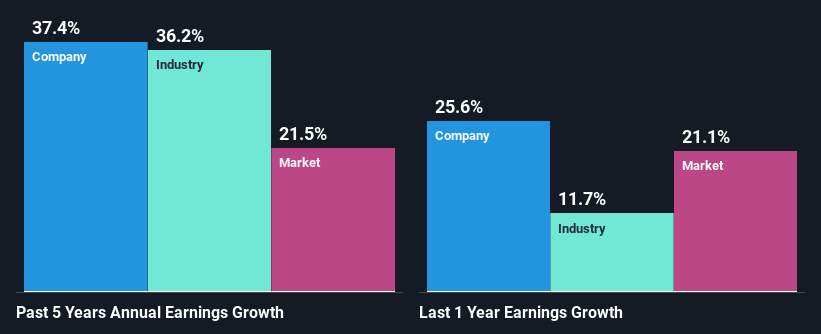Stock Analysis
- India
- /
- Hospitality
- /
- NSEI:INDHOTEL
The Indian Hotels Company Limited's (NSE:INDHOTEL) Stock Is Going Strong: Have Financials A Role To Play?

Indian Hotels' (NSE:INDHOTEL) stock is up by a considerable 14% over the past three months. Given that stock prices are usually aligned with a company's financial performance in the long-term, we decided to study its financial indicators more closely to see if they had a hand to play in the recent price move. In this article, we decided to focus on Indian Hotels' ROE.
Return on equity or ROE is a key measure used to assess how efficiently a company's management is utilizing the company's capital. Simply put, it is used to assess the profitability of a company in relation to its equity capital.
Check out our latest analysis for Indian Hotels
How Do You Calculate Return On Equity?
The formula for return on equity is:
Return on Equity = Net Profit (from continuing operations) ÷ Shareholders' Equity
So, based on the above formula, the ROE for Indian Hotels is:
13% = ₹13b ÷ ₹101b (Based on the trailing twelve months to March 2024).
The 'return' is the amount earned after tax over the last twelve months. Another way to think of that is that for every ₹1 worth of equity, the company was able to earn ₹0.13 in profit.
What Is The Relationship Between ROE And Earnings Growth?
So far, we've learned that ROE is a measure of a company's profitability. Based on how much of its profits the company chooses to reinvest or "retain", we are then able to evaluate a company's future ability to generate profits. Generally speaking, other things being equal, firms with a high return on equity and profit retention, have a higher growth rate than firms that don’t share these attributes.
A Side By Side comparison of Indian Hotels' Earnings Growth And 13% ROE
When you first look at it, Indian Hotels' ROE doesn't look that attractive. However, given that the company's ROE is similar to the average industry ROE of 11%, we may spare it some thought. Looking at Indian Hotels' exceptional 37% five-year net income growth in particular, we are definitely impressed. Given the slightly low ROE, it is likely that there could be some other aspects that are driving this growth. Such as - high earnings retention or an efficient management in place.
We then performed a comparison between Indian Hotels' net income growth with the industry, which revealed that the company's growth is similar to the average industry growth of 36% in the same 5-year period.

Earnings growth is a huge factor in stock valuation. It’s important for an investor to know whether the market has priced in the company's expected earnings growth (or decline). This then helps them determine if the stock is placed for a bright or bleak future. Is Indian Hotels fairly valued compared to other companies? These 3 valuation measures might help you decide.
Is Indian Hotels Using Its Retained Earnings Effectively?
Indian Hotels' three-year median payout ratio to shareholders is 0.4%, which is quite low. This implies that the company is retaining 100% of its profits. So it looks like Indian Hotels is reinvesting profits heavily to grow its business, which shows in its earnings growth.
Moreover, Indian Hotels is determined to keep sharing its profits with shareholders which we infer from its long history of eight years of paying a dividend. Our latest analyst data shows that the future payout ratio of the company is expected to rise to 20% over the next three years. However, Indian Hotels' future ROE is expected to rise to 17% despite the expected increase in the company's payout ratio. We infer that there could be other factors that could be driving the anticipated growth in the company's ROE.
Summary
In total, it does look like Indian Hotels has some positive aspects to its business. Despite its low rate of return, the fact that the company reinvests a very high portion of its profits into its business, no doubt contributed to its high earnings growth. Having said that, the company's earnings growth is expected to slow down, as forecasted in the current analyst estimates. To know more about the latest analysts predictions for the company, check out this visualization of analyst forecasts for the company.
Valuation is complex, but we're helping make it simple.
Find out whether Indian Hotels is potentially over or undervalued by checking out our comprehensive analysis, which includes fair value estimates, risks and warnings, dividends, insider transactions and financial health.
View the Free AnalysisHave feedback on this article? Concerned about the content? Get in touch with us directly. Alternatively, email editorial-team (at) simplywallst.com.
This article by Simply Wall St is general in nature. We provide commentary based on historical data and analyst forecasts only using an unbiased methodology and our articles are not intended to be financial advice. It does not constitute a recommendation to buy or sell any stock, and does not take account of your objectives, or your financial situation. We aim to bring you long-term focused analysis driven by fundamental data. Note that our analysis may not factor in the latest price-sensitive company announcements or qualitative material. Simply Wall St has no position in any stocks mentioned.
Valuation is complex, but we're helping make it simple.
Find out whether Indian Hotels is potentially over or undervalued by checking out our comprehensive analysis, which includes fair value estimates, risks and warnings, dividends, insider transactions and financial health.
View the Free AnalysisHave feedback on this article? Concerned about the content? Get in touch with us directly. Alternatively, email editorial-team@simplywallst.com
About NSEI:INDHOTEL
Indian Hotels
Owns, operates, and manages hotels, palaces, and resorts in India and internationally.
Flawless balance sheet with reasonable growth potential.

